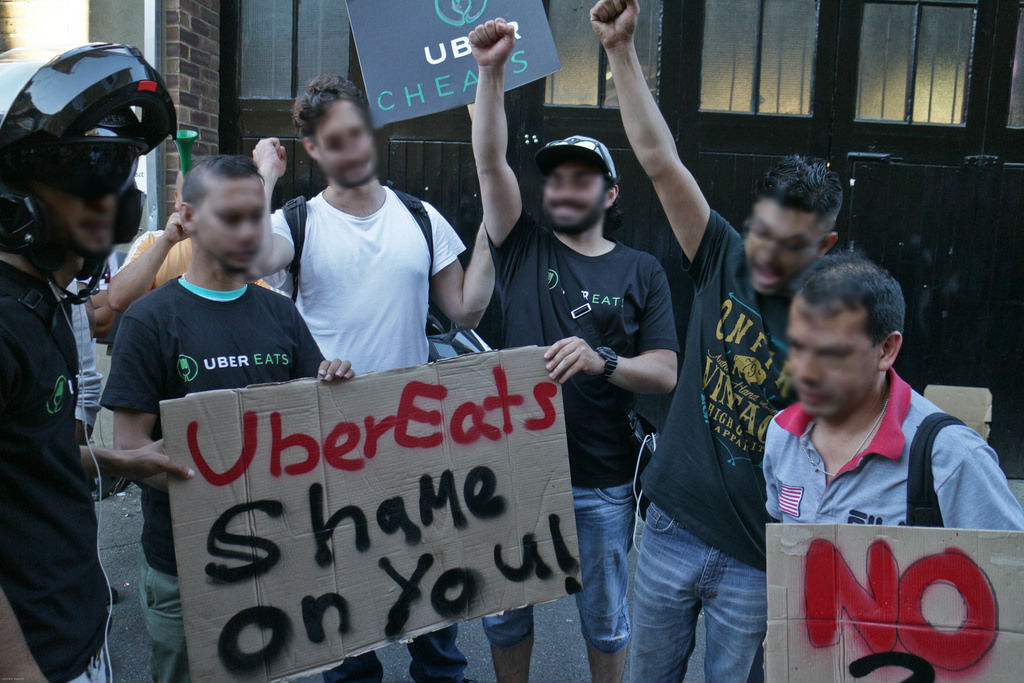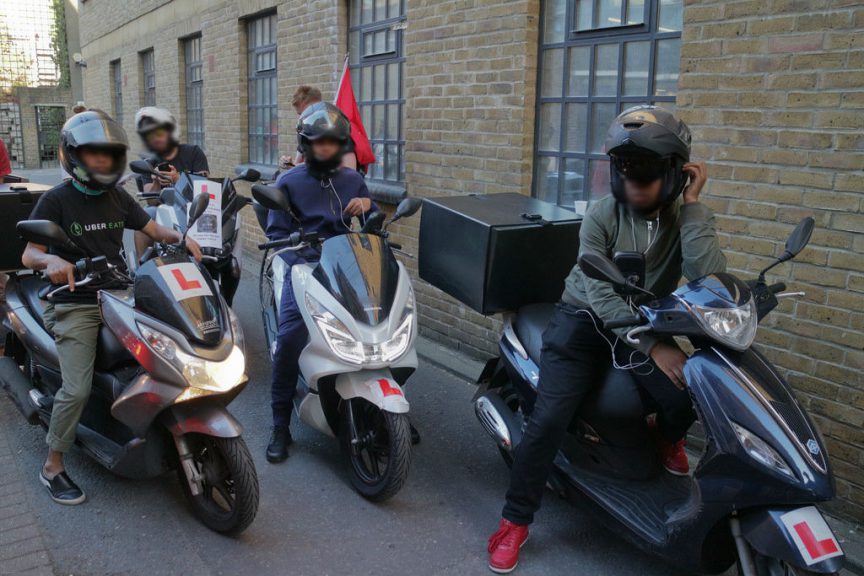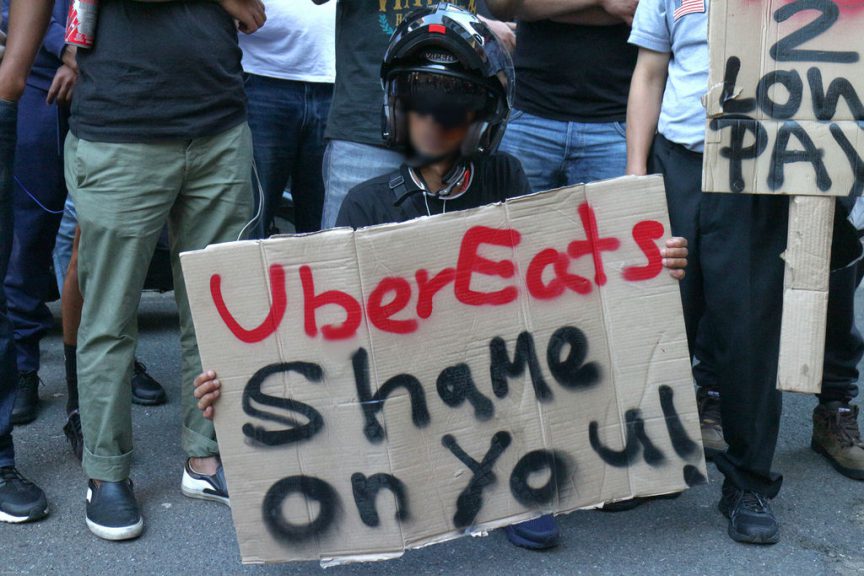UberEats Workers on Strike and Hungry for Fair Pay
by Joe Hayns
27 August 2016

This summer saw the London launch of UberEats – a new food delivery platform to rival Deliveroo. Yesterday UberEats drivers took their first strike action. Here’s a round-up:
Hungry?
UberEats management raised the empty-gesture stakes yesterday morning by responding to workers’ call for a citywide strike with the offer of… a free breakfast (‘supplies limited’, as the $68bn company admitted).
About 25% of UberEats’ 2-300 workers protested outside the company’s London HQ over the rapid worsening of pay and conditions. They’re demanding the London living wage, plus costs.
Their strike follows the lead of Deliveroo workers’ ongoing fight against management, with many Deliveroo workers turning out to support striking UberEats drivers.
Besides cereal, what are UberEats’ managers offering?
Costs.
When it started in June, UberEats was offering £100 for every sign-up and £20 per hour – a way of poaching workers from Deliveroo with a short-term offer. In the subsequent months, UberEats has reduced pay four times.
The recent change means workers will get £3.22 per delivery (off peak). That’s even worse than the dreadful, probably illegal wage scheme that rival Deliveroo is threatening – ‘trialling’ – currently.
Wages are crucial, but so are costs, and the stuff that UberEats (and Deliveroo) demand their workers pay for is shameful. Workers have to: pay for a bike, its upkeep and safety equipment; some of the petrol used; their phones, contracts, and data; road tax, MOT and insurance (and only one insurance company provides the cover workers need as food delivery riders – leading some workers to speculate whether UberEats is getting a cut out of this, too). Remember, you need all of this to begin working.

So – miserly pay, near-total cost-shifting onto workers and, finally, no help whatsoever when workers have an accident.
One worker reported that since the new pay regime came in, three riders he knows personally have had debilitating accidents, all during off-peak hours. The lower the wage, the harder riders have to push themselves.
Business models, model businesses?
Obviously something is very, very wrong with how Deliveroo and UberEats are operating. But what?
It’s crucial to understand these companies are not, in any sense, part of the so-called ‘sharing economy’; they’re not about ‘the recirculation of goods’ (eBay) or ‘the increased utilisation of assets’ (AirBnb). Instead, they’re aiming to monopolise and then charge ‘technological rents’ on the exchange of food between restaurants and consumers, taking a cut on each exchange. As one ex-CEO of the failed Take Eat Easy wrote in his company’s death rattle earlier this year: “Our job is to align supply and demand in time and space.” (And, well, that’s it).
Customers can only be squeezed so much, and whilst restaurants are happy for the new revenue stream, the 40% charge UberEats takes is already high – meaning it’s the workers who have to suffer for the model work. The fact Deliveroo is pushing so hard on pay is probably a sign of “flaws in its business and a degree of desperation,” as Christopher Williams noted in the Telegraph. He continues, the workers:
“Are the weak point in Deliveroo’s [and UberEats’] business, in economic terms, as they need to be paid. The more they are paid per delivery the less money the company makes and the further away an exit for its venture capital backers recedes.”
‘The weak point’.
Three things about this labour regime are haunting Deliveroo and, now, UberEats bosses:
First, the very technology that allows these companies to function allows workers to organise more easily. Deliveroo riders have to congregate across the city at pre-established areas to pick up orders; UberEats riders don’t even have that level of contact, and so they’ve had to communicate, initially, by flagging each other down individually. But once connected, hundreds of people can talk, share information and organise together – instantaneously.
Second, the fact that workers are ‘self-employed’ means none of the past four decades of anti-working class legislation against unionisation applies – they’re entirely free to stop working and demonstrate. In other words, as John Murray wrote for Novara Media: “For these new militants, precarity is strength.” This militancy is being supported by the IWGB union, which continues to do strong work with Deliveroo workers, and now the United Voices of the World union is involved too.
Third – and more important than any app – is that these workers are very, very angry, and rapidly learning how to do real damage to the boss-class: they’re reporting that some restaurants simply shut-off their UberEats connection last night, to the loss of thousands of pounds.

When the word went out that managers were giving an interview across the street, the entire demo ran to chant ‘UberEats, shame on you!’ at two ashen-faced tech-bros. This followed two security guards offering the crowd ice creams – bizarrely borrowing a tactic from Owen Smith – at which the crowd said ‘Fuck your ice cream’.
Where next? Expect more strikes, pickets of restaurants, and calls for boycotts: as one worker said yesterday: “This will go on as long as it has to.”
Photos: Steven Eason/Flickr
–
If you want to support media for a different politics, you can donate or subscribe to Novara Media at support.novaramedia.com.